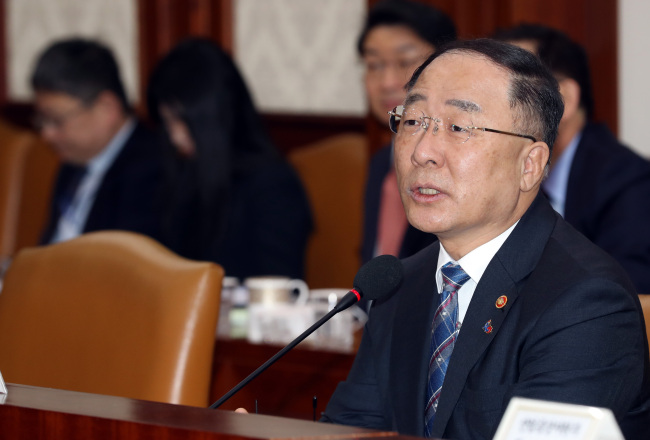The South Korean government will submit a supplementary budget bill to the parliament by April in an effort to respond to fine dust, a slowing economy and a sluggish job market, the chief fiscal policymaker said Wednesday.
It also pledged to reform the preliminary feasibility study for construction projects so as to reduce regional differences between metropolitan and nonmetropolitan areas and to curtail the average investigation period.
 |
Deputy Prime Minister and Finance Minister Hong Ham-ki (Yonhap) |
“In order to maximize the impact of the extra budget, the key is (to execute it at) the right timing,” said Deputy Prime Minister and Finance Minister Hong Nam-ki at a government meeting for economic revitalization.
“Starting today, (the Finance Ministry) will receive budget-related requests from respective government departments and review them in a strict yet swift manner, so as to establish an extra budget bill.”
The minister cited downside risks, such as the country’s slowing exports and struggling job market, as key reasons for the extra fiscal spending.
Asia’s fourth-largest economy saw its outbound shipment volume drop 8.2 percent in March from a year earlier, marking the fourth straight month of decline since December.
Last month, President Moon Jae-in had pressed government officials for an extra budget to counter worsening fine dust air pollution, which has become a serious problem on the Korean Peninsula.
If approved by the National Assembly, the budget will be used for fine dust reduction measures, such as scrapping outdated diesel vehicles.
The exact amount of the budget proposal, though yet to be determined, is likely to remain under 9 trillion won ($7.9 billion), according to the finance minister.
“(The amount) will not reach the recommendation level of the International Monetary Fund,” Kim told reporters after the government meeting, adding that details have yet to be confirmed.
The IMF recently suggested that to achieve targeted annual growth of 2.6-2.7 percent this year, Korea should establish an extra budget amounting to 0.5 percent of the nation’s gross domestic product, which is about 9 trillion won.
Minister Kim also laid out a plan to revise the preliminary feasibility study for infrastructure projects, aiming at lowering the threshold for nonmetropolitan areas.
“(The government) will cut down the rate of the economic feasibility factor and expand the regional balance factor by 5 percentage points respectively,” Kim said.
“We will also make efforts to reduce the average investigation period to around 12 months from the current 19 months.”
The planned actions are expected to benefit infrastructure projects in nonmetropolitan areas, which have so far been disadvantaged compared to profitable businesses in the Seoul-Gyeonggi zone.
The fiscal chief also said that he would meet with opposition leaders to ask for the swift passage of labor laws involving the reducing of working hours and the increased minimum wage.
“It is crucial that the corresponding (labor-related) laws are approved by April 5, when the provisional parliamentary session is due to end,” Kim said.
Meanwhile, conservative opposition politicians expressed disapproval over the government’s spending plans.
“(The extra budget) is an irresponsible action of borrowing money from our future generation,” said Rep. Na Kyung-won, floor leader of the main opposition Liberty Korea Party, citing the state debt that nears 1,700 trillion won.
The floor leader also claimed that the Moon administration and the ruling Democratic Party are attempting to win over voters ahead of the upcoming general elections.
By Bae Hyun-jung (
tellme@heraldcorp.com)







![[Today’s K-pop] Blackpink’s Jennie, Lisa invited to Coachella as solo acts](http://res.heraldm.com/phpwas/restmb_idxmake.php?idx=644&simg=/content/image/2024/11/21/20241121050099_0.jpg)
